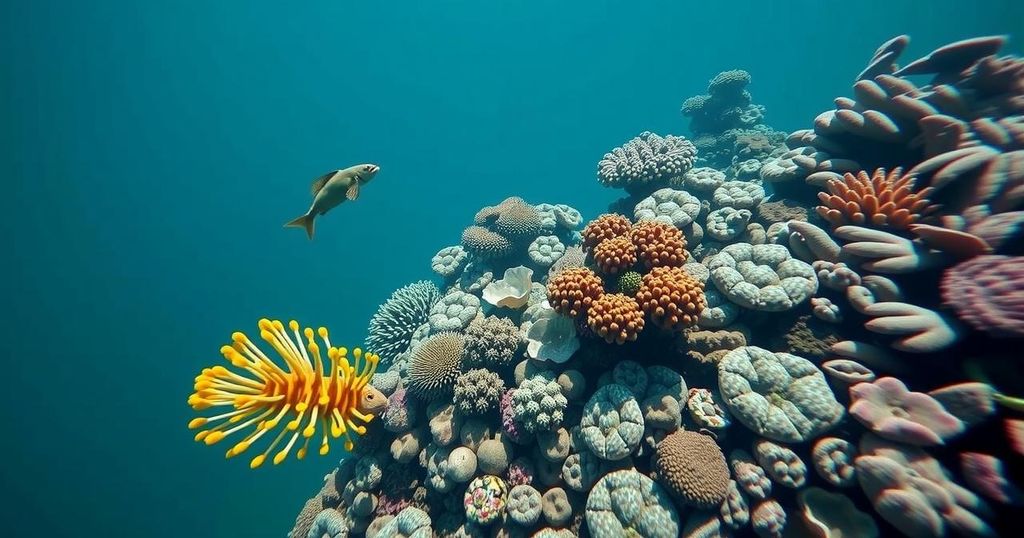Urgent Call to Protect Coral Reefs Amid Fourth Mass Bleaching Crisis

The U.N. convened an emergency session in Colombia regarding the unprecedented fourth mass bleaching of coral reefs, with 77% affected globally due to climate change. Governments pledged $30 million to support conservation efforts, emphasizing the ecological and socioeconomic importance of coral reefs. The session highlighted the urgent need for global action to protect these vital ecosystems.
In light of alarming findings regarding global coral bleaching, the United Nations, scientists, and various governments convened an emergency session during the U.N. biodiversity summit, COP16, in Cali, Colombia. Recent research indicates that 77% of the world’s coral reefs are experiencing bleaching, a phenomenon primarily attributed to rising ocean temperatures due to anthropogenic climate change. This event marks the fourth mass coral bleaching occurrence recorded, affecting reefs across both hemispheres. During this critical session, representatives from New Zealand, the United Kingdom, Germany, and France collectively committed approximately $30 million to the U.N. fund for coral reefs, which was established in 2020. The fund aims to mobilize $3 billion by the year 2030 for coral reef conservation globally. To date, around $225 million has been raised. The significance of coral reefs is paramount; they are essential ecosystems supporting over 25% of marine biodiversity and providing critical resources to nearly one billion people worldwide. U.K. Minister for Nature Mary Creagh emphasized the urgency of the situation, stating that “Protecting our ocean and its precious habitats is fundamental to life on earth. But without urgent action, the world’s coral reefs face extinction from global heating, acidification, disease, and pollution; a vital ecosystem lost within our lifetime.” Next year, the U.N. will host an ocean conference in Nice, France, where nations are encouraged to contribute an additional $150 million to the coral reef global fund before the gathering gains momentum. Peter Thomson, the U.N. Secretary-General’s Special Envoy for the Ocean, expressed grave concern over the ongoing decline of coral ecosystems: “In 2024, climate change and other human impacts triggered the fourth mass coral reef bleaching event, the most extensive and devastating on record. With the window to protect these ecosystems closing rapidly, world leaders must act now.” The detrimental repercussions of temperature changes on coral reefs are stark; shifts in water temperature can lead to corals expelling the algae that provide essential nutrients, resulting in bleaching and color loss. Other contributing factors include pollution, extreme low tides, and excessive sunlight. Notably, the Great Barrier Reef in Australia observed significant deterioration, with 90% of evaluated coral showing signs of bleaching in 2022. Similarly, the Florida Coral Reef, the third-largest globally, also experienced substantial bleaching recently. David Obura, a prominent Kenyan marine ecologist, highlighted a disturbing trend: “They’re lasting more than one year at a time, which is worrying.” This sentiment was echoed at the U.N. emergency session, underscoring the need for immediate and sustained action to safeguard coral reef ecosystems.
The global state of coral reefs is precarious, with reports highlighting that a significant majority are experiencing bleaching due to climatic changes largely induced by human activities. The United Nations has recognized the severity of this issue, prompting an emergency session in response to the alarming data presented on coral health. The impact of coral degradation extends beyond ecological loss; it poses a threat to the livelihoods and food security of millions who depend on these marine ecosystems. Initiatives aimed at funding conservation efforts are crucial for maintaining biodiversity and enhancing resilience against climate change.
In summary, the recent emergency session at the U.N. biodiversity summit underscores an urgent global call to action regarding the alarming rates of coral reef bleaching. The mobilization of funds from various governments signifies a collective acknowledgment of the critical role that coral reefs play in marine life and human sustenance. With the continued threat of climate change, immediate action is imperative to preserve these vital ecosystems for future generations.
Original Source: www.voanews.com






